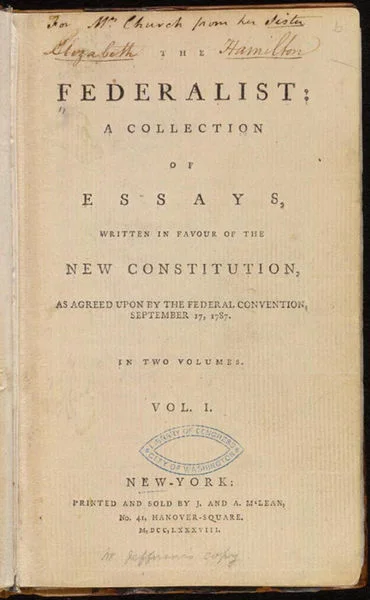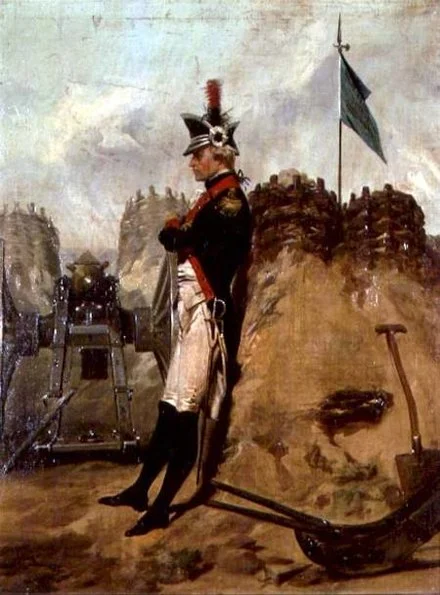Federalist #16 - Alexander Hamilton - Federalist Fridays
In Federalist #16 Alexander Hamilton discusses how the United States under the Articles of Confederation were destined for a civil war.
Hamilton further asserts that the Constitution is just the Government the Union needs to remain united.
Federalist # 16
Alexander Hamilton
December 4, 1787
The Insufficiency of the Present Confederation to Preserve the Union
In Federalist #16, Alexander Hamilton argues that the proposed Constitution is the best way for the United States to prevent a civil war.
Leaving behind prior discussions of why the United States were vulnerable to enemies and/or internal collapse, Hamilton goes all in on what exactly would lead to war between States.
It is interesting to note that although Hamilton claims the Constitution would prevent a internal fighting, everything written in Paper #16 sounds like an eerie prediction of the American Civil War.
Civil War
Hamilton first discusses several examples of historic civilizations who considered themselves confederacies. He points out that even the most respectable of these ended with war between the several governments.
Alexander continues by saying:
“It has been seen that delinquencies in the members of the Union are its natural and necessary offspring; and that whenever they happen, the only constitutional remedy is force, and the immediate effect of the use of it, civil war.”
In other words, when one government does not abide by the rules of the confederacy, the other governments must force it to by going to war.
Force
Hamilton likens the United States under the Articles of Confederation to one of the ancient confederacies, minus the use of force. Therefore, it’s basically nothing at all.
Alexander asserts that for the United States to truly act as a Union, it must empower the National Government with an army. This would give it the ability to compel the States to obey laws made at the federal level.
If this is not done, he predicts, then groups of States who are in agreement will naturally go to war with States who disagree to force compliance.
Deniability
Hamilton spends a large majority of Federalist #16 speaking of the various means by which a civil war might erupt from a lack of a stronger National Government and Standing Army.
The last few sentences I’d like to quote now at length, as Hamilton seems to give himself way out in case he was wrong:
“And as to those mortal feuds which…spread a conflagration through a whole nation…either from weighty causes of discontent given by the government or from the contagion of some violent popular paroxysm, they do not fall within any ordinary rules of calculation. When they happen, they commonly amount to revolutions and dismemberments of empire. No form of government can always either avoid or control them. It is in vain to hope to guard against events too mighty for human foresight or precaution, and it would be idle to object to a government because it could not perform impossibilities.”
With this sentence, Hamilton seems to be saying ‘If I’m wrong, it’s only because it would be impossible to stop a civil war anyway.’
Very convenient.
Anti-Federalist Argument
The first reaction an Anti-Federalist should have to Paper #16 is the same as stated in the previous paragraph. If revolutions happen anyway, what’s the point of this whole discussion? Isn’t the reason for the Standing Army to prevent such a thing?
Furthermore (and more commonly), the Anti-Federalists were certainly afraid of a National Government with a Standing Army. Especially one that Alexander Hamilton is, quite literally, saying will have the power to put down the State Militias should they attempt to resist federal laws.
In essence, if the leaders from Virginia, Pennsylvania and Massachusetts all agreed on something, it would (at that time) essentially become law. For other States, for example, New York, this was an extreme idea.
If you have missed any of our previous Federalist Fridays studies, you can go through them here.
To learn more about the Federalist Papers, I highly recommend picking up a copy of ‘Triumvirate’ which can be found through the affiliate link below.
Are you a regular read of Founder of the Day? I’d love to know what you think. What do you like? What do you hate? You can contact me on Facebook or Twitter or send me an email at contact@founderoftheday.com.
Thanks for reading!!!!






